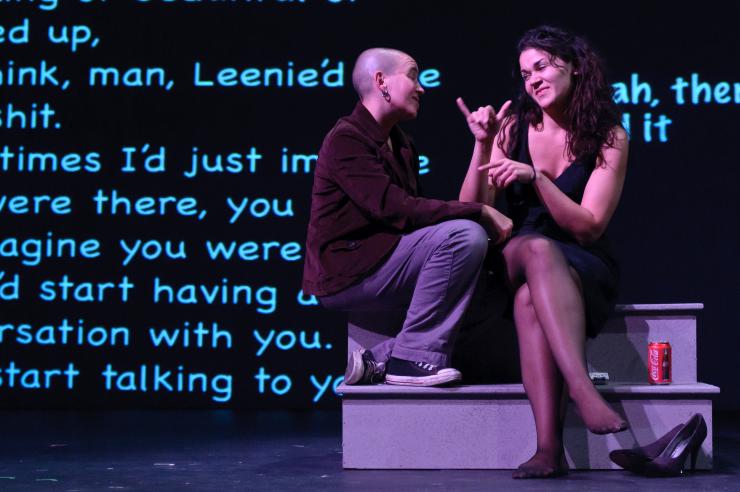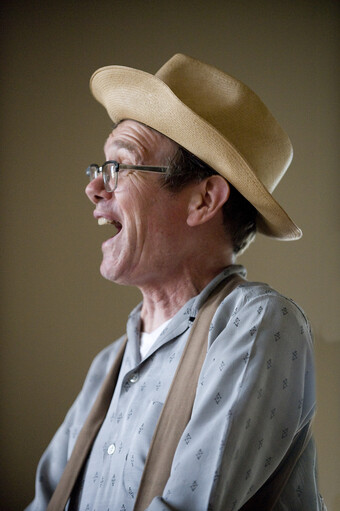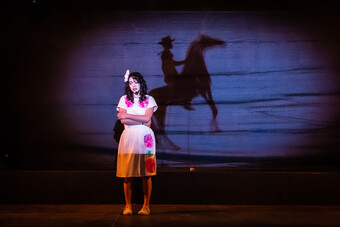Mixed Blood Theatre’s Disability Visibility Project
The Mixed Blood Theatre seeks an improvement in the relationship between the American theatre and disability. There is a canon of top-of-the-field theatrical literature that is under-produced, a talent pool that is underutilized and underemployed, and potential audiences in large numbers in every market in the US.
In an effort to spur change, Mixed Blood solicited forty theatre professionals to share plays that they feel best speak to disability in two ways: plays with theme or content on disability and/or plays with characters with disabilities. Over half of those polled self-identify as people with disabilities. In addition, medical and disability specialists were consulted and provided extensive categorization of professionally recognized disabilities that were crystalized to fewer, broader umbrellas.

Mixed Blood staff read every nominated play, and subsequently Mixed Blood’s Artistic Director Jack Reuler, with the assistance of Playwright-In-Residence Aditi Brennan Kapil, curated a select list of scripts for consideration by artistic directors, producers, and decision-makers. (It is worth mentioning that there were many great plays proposed for this collection that simply could not be produced with actors with the script’s characters’ disabilities, and thus did not make the list.) The selected plays are smart, funny, compelling, revelatory, diverse in style and content, and we sincerely hope to see a number of theatres embark on explorations that result in incredible theatre, and also potentially (re)define the relationship that an arts organization may have with disability communities.
$5000 is available to professional theatres that commit to produce one of these plays with the proviso that theatre artists with disabilities be employed in roles of characters with disabilities. As of this launch, funds are available for three professional not-for-profit theatres to commit to producing a play on this list (with appropriate hiring). The funds will be distributed on opening nights of those productions. If you wish to discuss any of the plays on this list, please feel free to contact Mixed Blood’s artistic staff, who have very much enjoyed reading all the nominations and are huge fans and advocates of the work.
And finally, this list is in no way a complete representation of all the amazing work by and about people with disabilities, and it does not try to be. It is a small initial step toward instigating change, a very small step. Please join in making the next step a larger one.
A brief list of eligible plays by and about people with disabilities:
Plays you may not know, but you should:
An Accident by Lydia Stryk (Physical—Spinal Cord Injury)
“fierce, funny, and surprisingly uplifting tour de force for two actors”-nominator
Blur by Melanie Marnich (Blind/Vision Impaired)
“lovely, poetic, and humorous” –nominator
Colossal by Andrew Hinderaker (Physical—Spinal Cord Injury)
“wonderful, epic-sized play, about love and loss” –nominator
Distracted by Lisa Loomer (ADHD)
“Immersed in a world wrought with sensory overload, Lisa Loomer’s humor and pathos reveals the complexity of ADHD”-nominator
Good Dancer by Emily Chaddick Weiss (Physical—Cerebral Palsy)
“a romantic comedy that takes on issues of race and disability” -nominator
History of Bowling by Mike Ervin (Blind/Deaf, Physical, Invisible)
“a sly and funny play, challenges preconceptions” -nominator
Love Person by Aditi Brennan Kapil (Deaf)
“a gorgeous exploration of the confounding language of love” -nominator
Peeling by Kaite O’Reilly (Deaf, Physical, Invisible)
“gorgeous, theatrical, quietly ground-breaking” -nominator
Someday by Julie Marie Myatt (Physical—Cerebral Palsy)
“universal issues of infertility and reproductive rights” -nominator
Soot and Spit by Charles Mee (Deaf, Autism Spectrum Disorder, Down Syndrome)
“poetic, contemplative, and celebratory” -nominator
Sweet Nothing in my Ear by Stephen Sachs (Deaf)
“…beautifully embraces deaf culture as a culture with its own language and traditions and not a disability”
Plays by John Belluso earned a category of their own:
Gretty Good Time (Physical)
“polio survivors in mid-1950’s. It is simply brilliant” -nominator
Pyretown (Physical)
“a lovely and romantic 2-hander” -nominator
The Body of Bourne (Physical)
“poetic, complex, and life-affirming” -nominator
The Rules of Charity (Physical—Cerebral Palsy)
“profound and intelligent” -nominator
Plays you’ve probably heard of, worth exploring in collaboration with actors with disabilities:
Children of a Lesser God by Mark Medoff (Deaf)
Fifth of July by Lanford Wilson (Physical)
Next to Normal by Kitt/Yorkey (Mental Health)
The Boys Next Door by Tom Griffin (Developmental, Mental Health)
The Cripple of Inishman by Martin McDonagh (Physical—Cerebral Palsy)
The Curious Incident of the Dog in the Nightime by Simon Stephens (Autism Spectrum Disorder)
The Normal Heart by Larry Kramer (Physical)
Plays INELIGIBLE for funding that we can’t resist mentioning:
We’d love to see these two pieces performed by their creators…
Still Standing by playwright/performer Anita Hollander (Physical)
Weights by playwright/performer Lynn Manning (Blind)
We hope you consider any/all of these plays for your upcoming season(s). To apply for funding, please send an email to [email protected] containing the following information:
Name of theatre:
Contact person including contact information:
Indicate whether or not you operate under an AEA contract:
Your play selection from the list above:
A projected timeline for the project:
Your commitment to working with theatre artists with disabilities in the context of this project:
Anything else you think we should know:
At this time we have funding for three productions, all submissions received by the deadline of July 31, 2015 will be considered. If selected, the funding will be released on opening night of the selected productions.
(Our thanks to those solicited for nominations: Claudia Alick, Brian Balcom, Ilana Brownstein, Christine Bruno, Polly Carl, Aaron Carter, Jeremy Cohen, Michael Dixon, Jason Dorwort, John Clinton Eisner, Liz Engelman, Liz Frankel, Wendy Goldberg, David Herrell, Anita Hollander, Morgan Jenness, D.J. Kurs, Regan Linton, John Mahon, Joy Meads, Chuck Mee, Kelly Miller, Emily Morse, Greg Mozgala, Susan Nussbaum, Amrita Ramanan, Ralph Remington, Jack Reuler, Jenny Sealey, Christopher Shinn, Sandy Shinner, Ann Stocking, Seema Sueko, Mike Thornton, Eric Ting, Mark Valdez, Alexandria Wailes, and Les Waters.)
*Disability Visibility is made possible by TCG’s A-Ha program with funds from the MetLife Foundation.








Comments
The article is just the start of the conversation—we want to know what you think about this subject, too! HowlRound is a space for knowledge-sharing, and we welcome spirited, thoughtful, and on-topic dialogue. Find our full comments policy here
As a disabled (Cerebral Palsy) theatre worker this is complicated for me. I think the impulse and the idea of creating higher visibility for disabled performers is an important goal and something worth striving for . However, I need to add a word of caution here . As a disabled performer , I have seen a lot of bad disability performance - where disabled performers were put onstage because they "deserved a shot" and often they couldn't love up to the demands of the role . Casting a disabled actor in a role simply on the basis of their disability is as bad as not casting an actor in a role on the basis of their disability . Also, this is still a nascent movement. Disabled people are still immigrants to this land called theatre . Every mediocre performance given by an actor with a disability makes it exponentially harder for the rest of us out there . I admire these playwrighs. I like these plays . I'm fond of many of the nominators , but I'm asking you as passionately as I know how - don't put disabled actors onstage just to do so. If they don't live up to the acting standard found in your company, if you wouldn't cast them if they didn't have a disability, do another show and forego the $500.00. Thanks for listening .
Dionysus the Inclusion Theatre in Houston has, for 18 years, performed shows with actors with disabilities and those who are non-disabled. We have done the Boys Next Door with 4 of our actors who were intellectually disabled. It was a total hit. We've also done Children of a Lesser God. I applaud y'all for this....I am also coming out with a guidebook on how theaters can integrate - 18 years and counting of the most amazing journey dealing with actors of all abilities. www.dionysustheatre.net- Deborah Nowinski, founder
As a Co-Chair of the board of Theater Breaking Through Barriers in NYC, a theater company dedicated to showcasing the talents of actors with disabilities, I'm thrilled to see these works and this issue get more visibility!
Thank you, Aditi Kapil and Jack Reuler, for creating this project and for the honor of including An Accident. One of the highlights of my professional life was last fall's workshop with Regan Linton and Greg Watanabe directed by Seema Sueko at Pasadena Playhouse where I discovered that with the change of a few stage directions it was possible to open the play up to wonderful actors like Regan whose recovery did not end with 'walking again.' I gained a radical new understanding of what recovery means, thanks to Regan, for while my own recovery from a serious accident ended with my walking again and is the reality upon which the original version is based, this 'alternate version for wheelchair users' adds a level of complexity to the theme of disability and recovery I could never have imagined.
My son, who has Down Syndrome was cast as "Georgie" in a college production of the final two plays of Tom Dudzick's Over the Tavern Trilogy. It was, according to the playwright, a rarity that a person with DS was cast in the role. It is, thankfully, happening more and more. This is a wonderful opportunity and I am appreciative of your efforts and advocacy!
I'm profoundly thankful for this advocacy and action in the field.
Please help our autistic voices be heard. Your autistic friends and voices need you. We are petitioning for The Curious Incident of the Dog in the Night-Time to cast an #AcutallyAutistic actor. Please help us by signing or sharing it with the producers. Also read the hundreds of brilliant reasons actual autistic people have written for why the signed (the bottom of the page/link)
https://www.change.org/p/th...